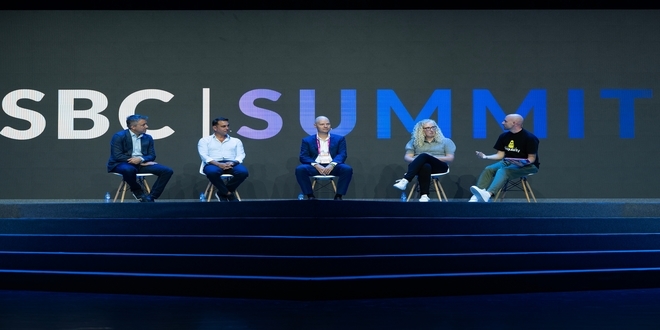
Global gambling firms are increasingly taking notice of AI, but are taking a cautious approach when it comes to its implementation.
This was made clear by the CEOs of some of the largest conglomerates in the sector at a panel hosted by SBC Summit Lisbon.
Joanne Whittaker, CEO of Betfred, Jesper Svensson, CEO of Betsson Group, Neal Menashe, CEO of Super Group, and Dan Taylor, CEO of Flutter International, were all questioned on the future of iGaming and AI by Simon Lidzén, CEO of Fast Track.
And while AI implementation is now part of all the above-listed businesses’ operations in some form or another, the leaders agreed on one thing – technological advancements in the space are inevitable, but they hide as many opportunities as they do risks.
Two sAIds of the same coin
For Svensson, the real value of AI, and to extent automation, is nestled in the fact that these are now being used to operate on a level that was previously thought impossible – especially when it comes to data and workflows.
“We’re starting to see something quite extraordinary,” he said. “It’s exciting to see that problems you thought there was no solution to a few years back can now be solved through technology.”
But it can also create equally-sized headaches, Betsson Group’s CEO observed, with the same technology being used to endanger businesses externally by testing the integrity of their cybersecurity.
Whittaker on the other hand looked at the risks of AI from a recruitment perspective, sharing that she’s left feeling ‘frightened’ by the idea that we’re reaching a point where thinking becomes obsolete, which in turn completely removes the ability to learn.
It can be expected that AI adoption by businesses from various industries will continue at pace, with GenAI the most commonly used although analytical AI is also finding its place.
The betting industry is no exception to this, with use cases being areas like marketing and particularly player protection. For Taylor and Menashe, striking a balance between adoption and control will be the gold standard going forward.
Taylor’s Flutter now sees AI as a core pillar of its business strategy, where speed is a priority when you’re competing on multiple continents. And in today’s world, everyone can be a competitor thanks to AI – not just the top dogs in the market.
“The right to win today doesn’t give us a divine right to win tomorrow,” Taylor said. “I’m aware of the risks of standing still because you’re one of the biggest.
“The ability to come in and compete is greater than it has ever been – because of the easier accessibility to build those products.”
Retail commands customer loyalty
All four CEOs also shared some interesting highlights in terms of changing consumer behaviour as a result of the general shifting landscape when it comes to technology.
Menashe spoke of the rise of the ‘bet influencers’, who use AI to build up a series of bets on events which they then share with their followers. Taylor confirmed his words by giving an example with Australia and Italy, where social betting enjoys high popularity.
“We’ve built a lot of our business down in Australia and Italy where the heart of it is a social platform,” Flutter International’s CEO said. “A quarter of the users in those two markets are accessing bets as a social platform, not a traditional UI.
“It’s fascinating to see that younger generations are engaging with products there in a way that is more akin to a social media app than to a betting product.”
From Betsson’s perspective, Svensson highlighted that the same younger generations are increasingly looking for crypto casino offerings – a migration of consumers that the licensed market in Europe will just have to stay and watch for now as crypto is still in the process of becoming a regulated tender.
The EU’s Markets in Crypto Assets (MiCA) regulations are giving interested companies more confidence, however, as seen by Yolo Group’s recent re-pivot towards regulated markets, seeing a future for crypto betting there. Betsson, one of Europe’s largest gaming companies, seems to see potential as well.
“We are seeing regulation happening now,” Svensson said in Lisbon. “We have the MICA regulation in Europe for crypto. It’s not standing still, and this gives some opportunities for companies, like our company, to tap into these areas.
“Sometimes you have to innovate in other areas within the regulatory framework, and that can be difficult.”
All in all, coming out of the discussion it appeared that the most future-proof gambling vertical remains the good old bookie, with Whittaker confirming that customers still like the retail experience, whether that’s in South Africa or in the UK.